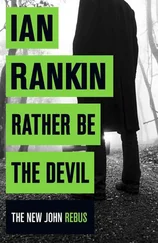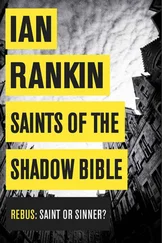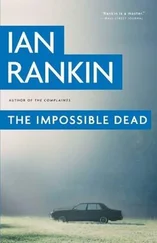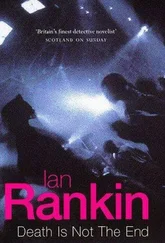Thomson hurled both glasses at once, so that they arrowed in towards Rebus, who ducked. The glasses collided above his head, shards raining down on him. Thomson had reached the front door, had hauled it open even, before Rebus was on him, lunging, pushing the younger man forwards through the doorway and onto the tenement landing. Thomson’s head hit the metal rails with a muted chime and he let out a single moan before collapsing. Rebus shook himself free of glass, feeling one or two tiny pieces nick him as he brushed a hand across his face. He brought a hand to his nose and inhaled deeply. His father had always said whisky would put hairs on his chest. Rebus wondered if the same miracle might be effected on his temples and the crown of his head...
It had been the perfect murder.
Well, almost. But Kenneth Thomson had reckoned without Rebus’s ability actually to believe someone innocent despite the evidence against him. The case against John MacFarlane had been overwhelming. Yet Rebus, feeling it to be wrong, had been forced to invent other scenarios, other motives and other means to the fairly chilling end. It wasn’t enough that Moira had died — died at the hands of someone she knew. MacFarlane had to be implicated in her murder. The killer had been out to tag them both. But it was Moira the killer hated, hated because she had broken a friendship as well as a heart.
Rebus stood on the steps of the police station. Thomson was in a cell somewhere below his feet, somewhere below ground level. Confessing to everything. He would go to jail, while John MacFarlane, perhaps not realising his luck, had already been freed.
The streets were busy now. Lunchtime traffic, the reliable noises of the everyday. The sun was even managing to burst from its slumber. All of which reminded Rebus that his day was over. Time, all in all he felt, for a short visit home, a shower and a change of clothes, and, God and the Devil willing, some sleep.
The locals in Barnton knew him either as ‘the Brigadier’ or as ‘that Army type who bought the West Lodge’. West Lodge was a huge but until recently neglected detached house set in a walled acre and a half of grounds and copses. Most locals were relieved that its high walls hid it from general view, the house itself being too angular, too gothic for modern tastes. Certainly, it was very large for the needs of a widower and his unsmiling daughter. Mrs MacLennan, who cleaned for the Brigadier, was pumped for information by curious neighbours, but could say only that Brigadier-General Dean had had some renovations done, that most of the house was habitable, that one room had become a library, another a billiard-room, another a study, another a makeshift gymnasium and so on. The listeners would drink this in deeply, yet it was never enough. What about the daughter? What about the Brigadier’s background? What happened to his wife?
Shopkeepers too were asked for their thoughts. The Brigadier drove a sporty open-topped car which would pull in noisily to the side of the road to allow him to pop into this or that shop for a few things, including, each day at the same time, a bottle of something or other from the smarter of the two off-licences.
The grocer, Bob Sladden, reckoned that Brigadier-General Dean had been born nearby, even that he had lived for a few childhood years in West Lodge and so had retired there because of its carefree connections. But Miss Dalrymple, who at ninety-three was as old as anyone in that part of Barnton, could not recall any family named Dean living at West Lodge. Could not, indeed, recall any Deans ever living in this ‘neck’ of Barnton, with the exception of Sam Dean. But when pressed about Sam Dean, she merely shook her head and said, ‘He was no good, that one, and got what he deserved. The Great War saw to him.’ Then she would nod slowly, thoughtfully, and nobody would be any further forward.
Speculation grew wilder as no new facts came to light, and in The Claymore public bar one afternoon, a bar never patronised by the Brigadier (and who’d ever heard of an Army man not liking his drink?), a young out-of-work plasterer named Willie Barr came up with a fresh proposition.
‘Maybe Dean isn’t his real name.’
But everyone around the pool table laughed at that and Willie just shrugged, readying to play his next shot. ‘Well,’ he said, ‘real name or not, I wouldn’t climb over that daughter of his to get to any of you lot.’
Then he played a double off the cushion, but missed. Missed not because the shot was difficult or he’d had too many pints of Snakebite, but because his cue arm jerked at the noise of the explosion.
It was a fancy car all right, a Jaguar XJS convertible, its bodywork a startling red. Nobody in Barnton could mistake it for anyone else’s car. Besides, everyone was used to it revving to its loud roadside halt, was used to its contented ticking-over while the Brigadier did his shopping. Some complained — though never to his face — about the noise, about the fumes from the exhaust. They couldn’t say why he never switched off the ignition. He always seemed to want to be ready for a quick getaway. On this particular afternoon, the getaway was quicker even than usual, a squeal of tyres as the car jerked out into the road and sped past the shops. Its driver seemed ready actually to disregard the red stop light at the busy junction. He never got the chance. There was a ball of flames where the car had been and the heart-stopping sound of the explosion. Twisted metal flew into the air, then down again, wounding passers-by, burning skin. Shop windows blew in, shards of fine glass finding soft targets. The traffic lights turned to green, but nothing moved in the street.
For a moment, there was a silence punctuated only by the arrival on terra firma of bits of speedometer, headlamp, even steering-wheel. Then the screaming started, as people realised they’d been wounded. More curdling still though were the silences, the dumb horrified faces of people who would never forget this moment, whose shock would disturb each wakeful night.
And then there was a man, standing in a doorway, the doorway of what had been the wine merchant’s. He carried a bottle with him, carefully wrapped in green paper, and his mouth was open in surprise. He dropped the bottle with a crash when he realised his car was not where he had left it, realising that the roaring he had heard and thought he recognised was that of his own car being driven away. At his feet, he saw one of his driving gloves lying on the pavement in front of him. It was still smouldering. Only five minutes before, it had been lying on the leather of his passenger seat. The wine merchant was standing beside him now, pale and shaking, looking in dire need of a drink. The Brigadier nodded towards the carcass of his sleek red Jaguar.
‘That should have been me,’ he said. Then: ‘Do you mind if I use your telephone?’
John Rebus threw The Dain Curse up in the air, sending it spinning towards his living-room ceiling. Gravity caught up with it just short of the ceiling and pulled it down hard, so that it landed open against the uncarpeted floor. It was a cheap copy, bought secondhand and previously much read. But not by Rebus; he’d got as far as the beginning of the third section, ‘Quesada’, before giving up, before tossing what many regard as Hammett’s finest novel into the air. Its pages fell away from the spine as it landed, scattering chapters. Rebus growled. The telephone had, as though prompted by the book’s demise, started ringing. Softly, insistently. Rebus picked up the apparatus and studied it. It was six o’clock on the evening of his first rest-day in what seemed like months. Who would be phoning him? Pleasure or business? And which would he prefer it to be? He put the receiver to his ear.
Читать дальше












